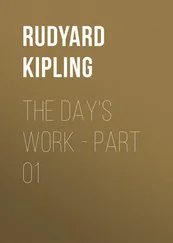Джозеф Киплинг - The Day's Work - Volume 1
Здесь есть возможность читать онлайн «Джозеф Киплинг - The Day's Work - Volume 1» весь текст электронной книги совершенно бесплатно (целиком полную версию без сокращений). В некоторых случаях можно слушать аудио, скачать через торрент в формате fb2 и присутствует краткое содержание. Год выпуска: 2014, Издательство: epubBooks Classics, Жанр: Прочие приключения, на английском языке. Описание произведения, (предисловие) а так же отзывы посетителей доступны на портале библиотеки ЛибКат.
- Название:The Day's Work - Volume 1
- Автор:
- Издательство:epubBooks Classics
- Жанр:
- Год:2014
- ISBN:нет данных
- Рейтинг книги:3 / 5. Голосов: 1
-
Избранное:Добавить в избранное
- Отзывы:
-
Ваша оценка:
- 60
- 1
- 2
- 3
- 4
- 5
The Day's Work - Volume 1: краткое содержание, описание и аннотация
Предлагаем к чтению аннотацию, описание, краткое содержание или предисловие (зависит от того, что написал сам автор книги «The Day's Work - Volume 1»). Если вы не нашли необходимую информацию о книге — напишите в комментариях, мы постараемся отыскать её.
The Day's Work - Volume 1 — читать онлайн бесплатно полную книгу (весь текст) целиком
Ниже представлен текст книги, разбитый по страницам. Система сохранения места последней прочитанной страницы, позволяет с удобством читать онлайн бесплатно книгу «The Day's Work - Volume 1», без необходимости каждый раз заново искать на чём Вы остановились. Поставьте закладку, и сможете в любой момент перейти на страницу, на которой закончили чтение.
Интервал:
Закладка:
If the Red Slayer think he slays,
Or if the slain think he is slain,
They know not well the subtle ways
I keep and pass and turn again.
It was the unreproducible slid r, as he said this was his "fy–ist" visit to England, that told me he was a New–Yorker from New York; and when, in the course of our long, lazy journey westward from Waterloo, he enlarged upon the beauties of his city, I, professing ignorance, said no word. He had, amazed and delighted at the man's civility, given the London porter a shilling for carrying his bag nearly fifty yards; he had thoroughly investigated the first–class lavatory compartment, which the London and Southwestern sometimes supply without extra charge; and now, half–awed, half–contemptuous, but wholly interested, he looked out upon the ordered English landscape wrapped in its Sunday peace, while I watched the wonder grow upon his face. Why were the cars so short and stilted? Why had every other freight–car a tarpaulin drawn over it? What wages would an engineer get now? Where was the swarming population of England he had read so much about? What was the rank of all those men on tricycles along the roads? When were we due at Plymouth I told him all I knew, and very much that I did not. He was going to Plymouth to assist in a consultation upon a fellow–countryman who had retired to a place called The Hoe—was that up–town or down–town—to recover from nervous dyspepsia. Yes, he himself was a doctor by profession, and how any one in England could retain any nervous disorder passed his comprehension. Never had he dreamed of an atmosphere so soothing. Even the deep rumble of London traffic was monastical by comparison with some cities he could name; and the country—why, it was Paradise. A continuance of it, he confessed, would drive him mad; but for a few months it was the most sumptuous rest–cure in his knowledge.
"I'll come over every year after this," he said, in a burst of delight, as we ran between two ten–foot hedges of pink and white may. "It's seeing all the things I've ever read about. Of course it doesn't strike you that way. I presume you belong here? What a finished land it is! It's arrived. 'Must have been born this way. Now, where I used to live—Hello I what's up?"
The train stopped in a blaze of sunshine at Framlynghame Admiral, which is made up entirely of the name–board, two platforms, and an overhead bridge, without even the usual siding. I had never known the slowest of locals stop here before; but on Sunday all things are possible to the London and Southwestern. One could hear the drone of conversation along the carriages, and, scarcely less loud, the drone of the bumblebees in the wallflowers up the bank. My companion thrust his head through the window and sniffed luxuriously.
"Where are we now?" said he.
"In Wiltshire," said I.
"Ah! A man ought to be able to write novels with his left hand in a country like this. Well, well! And so this is about Tess's country, ain't it? I feel just as if I were in a book. Say, the conduc—the guard has something on his mind. What's he getting at?"
The splendid badged and belted guard was striding up the platform at the regulation official pace, and in the regulation official voice was saying at each door:
"Has any gentleman here a bottle of medicine? A gentleman has taken a bottle of poison (laudanum) by mistake."
Between each five paces he looked at an official telegram in his hand, refreshed his memory, and said his say. The dreamy look on my companion's face—he had gone far away with Tess—passed with the speed of a snap–shutter. After the manner of his countrymen, he had risen to the situation, jerked his bag down from the overhead rail, opened it, and I heard the click of bottles. "Find out where the man is," he said briefly. "I've got something here that will fix him—if he can swallow still."
Swiftly I fled up the line of carriages in the wake of the guard. There was clamour in a rear compartment—the voice of one bellowing to be let out, and the feet of one who kicked. With the tail of my eye I saw the New York doctor hastening thither, bearing in his hand a blue and brimming glass from the lavatory compartment. The guard I found scratching his head unofficially, by the engine, and murmuring: "Well, I put a bottle of medicine off at Andover—I'm sure I did."
"Better say it again, any'ow'," said the driver. "Orders is orders. Say it again."
Once more the guard paced back, I, anxious to attract his attention, trotting at his heels.
"In a minute—in a minute, sir," he said, waving an arm capable of starting all the traffic on the London and Southwestern Railway at a wave. "Has any gentleman here got a bottle of medicine? A gentleman has taken a bottle of poison (laudanum) by mistake."
"Where's the man?" I gasped.
"Woking. 'Ere's my orders." He showed me the telegram, on which were the words to be said. "'E must have left 'is bottle in the train, an' took another by mistake. 'E's been wirin' from Woking awful, an', now I come to think of, it, I'm nearly sure I put a bottle of medicine off at Andover."
"Then the man that took the poison isn't in the train?"
"Lord, no, sir. No one didn't take poison that way. 'E took it away with 'im, in 'is 'ands. 'E's wirin' from Wokin'. My orders was to ask everybody in the train, and I 'ave, an' we're four minutes late now. Are you comin' on, sir? No? Right be'ind!"
There is nothing, unless, perhaps, the English language, more terrible than the workings of an English railway–line. An instant before it seemed as though we were going to spend all eternity at Framlynghame Admiral, and now I was watching the tail of the train disappear round the curve of the cutting.
But I was not alone. On the one bench of the down platform sat the largest navvy I have ever seen in my life, softened and made affable (for he smiled generously) with liquor. In his huge hands he nursed an empty tumbler marked "L.S.W.R."—marked also, internally, with streaks of blue–grey sediment. Before him, a hand on his shoulder, stood the doctor, and as I came within ear–shot, this is what I heard him say: "Just you hold on to your patience for a minute or two longer, and you'll be as right as ever you were in your life. I'll stay with you till you're better."
"Lord! I'm comfortable enough," said the navvy. "Never felt better in my life."
Turning to me, the doctor lowered his voice. "He might have died while that fool conduct–guard was saying his piece. I've fixed him, though. The stuff's due in about five minutes, but there's a heap to him. I don't see how we can make him take exercise."
For the moment I felt as though seven pounds of crushed ice had been neatly applied in the form of a compress to my lower stomach.
"How—how did you manage it?" I gasped.
"I asked him if he'd have a drink. He was knocking spots out of the car—strength of his constitution, I suppose. He said he'd go 'most anywhere for a drink, so I lured onto the platform, and loaded him up. 'Cold–blooded people, you Britishers are. That train's gone, and no one seemed to care a cent."
"We've missed it," I said.
He looked at me curiously.
"We'll get another before sundown, if that's your only trouble. Say, porter, when's the next train down?"
"Seven forty–five," said the one porter, and passed out through the wicket–gate into the landscape. It was then three–twenty of a hot and sleepy afternoon. The station was absolutely deserted. The navvy had closed his eyes, and now nodded.
"That's bad," said the doctor. "The man, I mean, not the train. We must make him walk somehow—walk up and down."
Swiftly as might be, I explained the delicacy of the situation, and the doctor from New York turned a full bronze–green. Then he swore comprehensively at the entire fabric of our glorious Constitution, cursing the English language, root, branch, and paradigm, through its most obscure derivatives. His coat and bag lay on the bench next to the sleeper. Thither he edged cautiously, and I saw treachery in his eye.
Читать дальшеИнтервал:
Закладка:
Похожие книги на «The Day's Work - Volume 1»
Представляем Вашему вниманию похожие книги на «The Day's Work - Volume 1» списком для выбора. Мы отобрали схожую по названию и смыслу литературу в надежде предоставить читателям больше вариантов отыскать новые, интересные, ещё непрочитанные произведения.
Обсуждение, отзывы о книге «The Day's Work - Volume 1» и просто собственные мнения читателей. Оставьте ваши комментарии, напишите, что Вы думаете о произведении, его смысле или главных героях. Укажите что конкретно понравилось, а что нет, и почему Вы так считаете.












